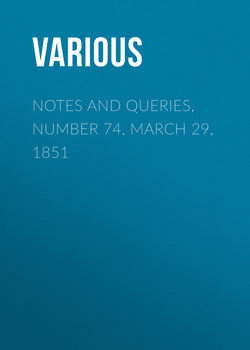Читать книгу Notes and Queries, Number 74, March 29, 1851 - Various - Страница 6
Queries
ОглавлениеANCIENT DANISH ITINERARY: PROL IN ANGLIAM
An ancient scholiast on Adam of Bremen, "paululum Adamo ratione ætatis inferior," according to his editor, Joachim Maderus, supplies us with a curious list of the stations in the voyages from Ripa, in Denmark, to Acre, in the Holy Land. Adam of Bremen's Ecclesiastical History dates toward the end of the eleventh century, about 1070. His text is as follows:—
"Alterum (episcopatum) in Ripa; quæ civitas alio tangitur alveo, qui ab oceano influit, et per quem vela torquentur in Fresiam, vel in nostram Saxoniam, vel certe in Angliam."
The scholiast has this note:—
"De Ripa in Flandriam ad Cuicfal velificari potest duobus diebus, et totidem noctibus; de Cuicfal ad Prol in Angliam duobus diebus et una nocte. Illud est ultimum caput Angliæ versus Austrum, et est processus illuc de Ripa angulosus inter Austrum et Occidentem. De Prol in Britanniam ad Sanctum Matthiam, uno die,—inde ad Far, juxta Sanctum Jacobum tribus noctibus. Inde Leskebone duobus diebus inter Austrum et Occidentem. De Leskebone ad Narvese tribus diebus et tribus noctibus, angulariter inter Orientem et Austrum. De Narvese ad Arruguen quatuor diebus et quatuor noctibus, angulariter inter Aquilonem et Orientem. De Arruguen ad Barzalun uno die, similiter inter Aquilonem et Orientem. De Barzalun ad Marsiliam uno die et una nocte, fere versus Orientem, declinando tamen parum ad plagam Australem. De Marsilia ad Mezein in Siciliam quatuor diebus et quatuor noctibus, angulariter inter Orientem et Austrum. De Mezein ad Accharon xiiii diebus et totidem noctibus, inter Orientem et Austrum, magis appropiando ad Austrum."
We may fairly consider that the stations marked in this itinerary are of great antiquity. "Prol in Angliam" is, no doubt, Prawle Point, in Devonshire; a headland which must have been well known to the Veneti long before the days of Adam of Bremen. Its mention here is one among the many proofs of the early importance of this coast, the ancient "Littus Totonesium," the scene of one of Marie's fabliaux, and of some curious passages in Layamon's Brut, which are not to be found in the poem of Wace. I wish to ask,—
1. Is the word "Prol" Saxon or British, and what is its probable etymology?
2. Where was "Cuicfal in Flandriam," from whence the voyage was made to Prol?
Richard John King.
CHIMING, TOLLING, AND PEAL-RINGING OF BELLS
Some of your clerical readers, as well as myself, would probably be glad to have determined, what are the proper times and measures in which the bells of a church ought to be rung. There seems to be no uniformity of practice in this matter, nor any authoritative directions, by which the customs that obtain may be either improved or regulated. The terms chiming, tolling, and peal-ringing, though now generally understood, do not intelligibly apply to the few regulations about bells which occur in the canons.
I believe that chiming is the proper method of summoning the congregation to the services of the church: and tolling certainly appears to be the most appropriate use of the bell at funerals. But chiming the bells is an art that is not recognised in the older rules respecting their use. For instance, the Fifteenth Canon orders that on Wednesdays and Fridays weekly, warning shall be given to the people that litany will be said, by tolling of a bell. And, on the other hand, though we toll at a funeral, the Sixty-seventh Canon enjoins that—
"After the party's death, there shall be rung no more but one short peal, and one other before the burial, and one other after the burial.
The peal here alluded to does not of course mean what Mr. Ellacombe has so clearly described to be a modern peal, in Vol. i., p. 154., of "Notes and Queries;" but it would at least amount, I suppose, to consonantia campanarum, a ringing together of bells, as distinguished from the toll or single stroke on a bell. Horne Tooke says:
"The toll of a bell is its being lifted up (tollere, to raise), which causes that sound we call its toll."
The poet does not clear the ambiguity and confusion of terms, when he sings—
"Faintly as tolls the evening chime!"
Peals are not heard in London on Sunday mornings, I believe; but in the country, at least hereabouts, they are commonly rung as the summons to church, ending with a few strokes on one bell; and then a smaller bell than any in the peal (the sanctus bell of old, perhaps, and now sometimes vulgarly called "Tom Tinkler") announces that divine service is about to begin.
